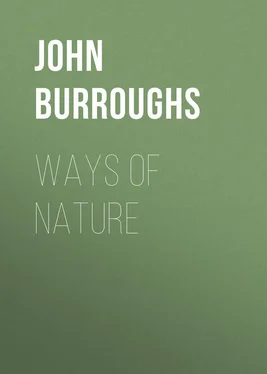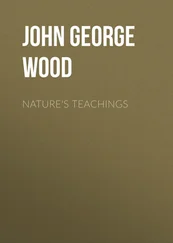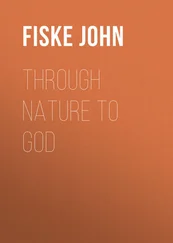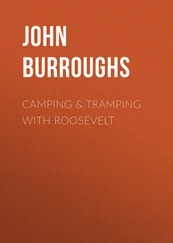John Burroughs - Ways of Nature
Здесь есть возможность читать онлайн «John Burroughs - Ways of Nature» — ознакомительный отрывок электронной книги совершенно бесплатно, а после прочтения отрывка купить полную версию. В некоторых случаях можно слушать аудио, скачать через торрент в формате fb2 и присутствует краткое содержание. Жанр: foreign_antique, foreign_prose, на английском языке. Описание произведения, (предисловие) а так же отзывы посетителей доступны на портале библиотеки ЛибКат.
- Название:Ways of Nature
- Автор:
- Жанр:
- Год:неизвестен
- ISBN:нет данных
- Рейтинг книги:3 / 5. Голосов: 1
-
Избранное:Добавить в избранное
- Отзывы:
-
Ваша оценка:
- 60
- 1
- 2
- 3
- 4
- 5
Ways of Nature: краткое содержание, описание и аннотация
Предлагаем к чтению аннотацию, описание, краткое содержание или предисловие (зависит от того, что написал сам автор книги «Ways of Nature»). Если вы не нашли необходимую информацию о книге — напишите в комментариях, мы постараемся отыскать её.
Ways of Nature — читать онлайн ознакомительный отрывок
Ниже представлен текст книги, разбитый по страницам. Система сохранения места последней прочитанной страницы, позволяет с удобством читать онлайн бесплатно книгу «Ways of Nature», без необходимости каждый раз заново искать на чём Вы остановились. Поставьте закладку, и сможете в любой момент перейти на страницу, на которой закончили чтение.
Интервал:
Закладка:
The swift is a stiff flyer: there appear to be no joints in her wings; she suggests something made of wires or of steel. Yet the air of frolic and of superabundance of wing-power is more marked with her than with any other of our birds. Her feeding and twig-gathering seem like asides in a life of endless play. Several times both in spring and fall I have seen swifts gather in immense numbers toward nightfall, to take refuge in large unused chimney-stacks. On such occasions they seem to be coming together for some aerial festival or grand celebration; and, as if bent upon a final effort to work off a part of their superabundant wing-power before settling down for the night, they circle and circle high above the chimney-top, a great cloud of them, drifting this way and that, all in high spirits and chippering as they fly. Their numbers constantly increase as other members of the clan come dashing in from all points of the compass. Swifts seem to materialize out of empty air on all sides of the chippering, whirling ring, as an hour or more this assembling of the clan and this flight festival go on. The birds must gather in from whole counties, or from half a State. They have been on the wing all day, and yet now they seem as tireless as the wind, and as if unable to curb their powers.
One fall they gathered in this way and took refuge for the night in a large chimney-stack in a city near me, for more than a month and a half. Several times I went to town to witness the spectacle, and a spectacle it was: ten thousand of them, I should think, filling the air above a whole square like a whirling swarm of huge black bees, but saluting the ear with a multitudinous chippering, instead of a humming. People gathered upon the sidewalks to see them. It was a rare circus performance, free to all. After a great many feints and playful approaches, the whirling ring of birds would suddenly grow denser above the chimney; then a stream of them, as if drawn down by some power of suction, would pour into the opening. For only a few seconds would this downward rush continue; then, as if the spirit of frolic had again got the upper hand of them, the ring would rise, and the chippering and circling go on. In a minute or two the same manœuvre would be repeated, the chimney, as it were, taking its swallows at intervals to prevent choking. It usually took a half-hour or more for the birds all to disappear down its capacious throat. There was always an air of timidity and irresolution about their approach to the chimney, just as there always is about their approach to the dead tree-top from which they procure their twigs for nest-building. Often did I see birds hesitate above the opening and then pass on, apparently as though they had not struck it at just the right angle. On one occasion a solitary bird was left flying, and it took three or four trials either to make up its mind or to catch the trick of the descent. On dark or threatening or stormy days the birds would begin to assemble by mid-afternoon, and by four or five o'clock were all in their lodgings.
The chimney is a capacious one, forty or fifty feet high and nearly three feet square, yet it did not seem adequate to afford breathing-space for so many birds. I was curious to know how they disposed themselves inside. At the bottom was a small opening. Holding my ear to it, I could hear a continuous chippering and humming, as if the birds were still all in motion, like an agitated beehive. At nine o'clock this multitudinous sound of wings and voices was still going on, and doubtless it was kept up all night. What was the meaning of it? Was the press of birds so great that they needed to keep their wings moving to ventilate the shaft, as do certain of the bees in a crowded hive? Or were these restless spirits unable to fold their wings even in sleep? I was very curious to get a peep inside that chimney when the swifts were in it. So one afternoon this opportunity was afforded me by the removal of the large smoke-pipe of the old steam-boiler. This left an opening into which I could thrust my head and shoulders. The sound of wings and voices filled the hollow shaft. On looking up, I saw the sides of the chimney for about half its length paved with the restless birds; they sat so close together that their bodies touched. Moreover, a large number of them were constantly on the wing, showing against the sky light as if they were leaving the chimney. But they did not leave it. They rose up a few feet and then resumed their positions upon the sides, and it was this movement that caused the humming sound. All the while the droppings of the birds came down like a summer shower. At the bottom of the shaft was a mine of guano three or four feet deep, with a dead swift here and there upon it. Probably one or more birds out of such a multitude died every night. I had fancied there would be many more. It was a long time before it dawned upon me what this uninterrupted flight within the chimney meant. Finally I saw that it was a sanitary measure: only thus could the birds keep from soiling each other with their droppings. Birds digest very rapidly, and had they all continued to cling to the sides of the wall, they would have been in a sad predicament before morning. Like other acts of cleanliness on the part of birds, this was doubtless the prompting of instinct and not of judgment. It was Nature looking out for her own.
In view, then, of the doubtful sense or intelligence of the wild creatures, what shall we say of the new school of nature writers or natural history romancers that has lately arisen, and that reads into the birds and animals almost the entire human psychology? This, surely: so far as these writers awaken an interest in the wild denizens of the field and wood, and foster a genuine love of them in the hearts of the young people, so far is their influence good; but so far as they pervert natural history and give false impressions of the intelligence of our animals, catering to a taste that prefers the fanciful to the true and the real, is their influence bad. Of course the great army of readers prefer this sugar-coated natural history to the real thing, but the danger always is that an indulgence of this taste will take away a liking for the real thing, or prevent its development. The knowing ones, those who can take these pretty tales with the pinch of salt of real knowledge, are not many; the great majority are simply entertained while they are being humbugged. There may be no very serious objection to the popular love of sweets being catered to in this field by serving up the life-history of our animals in a story, all the missing links supplied, and all their motives and acts humanized, provided it is not done covertly and under the guise of a real history. We are never at a loss how to take Kipling in his "Jungle Book;" we are pretty sure that this is fact dressed up as fiction, and that much of the real life of the jungle is in these stories. I remember reading his story of "The White Seal" shortly after I had visited the Seal Islands in Bering Sea, and I could not detect in the story one departure from the facts of the life-history of the seal, so far as it is known. Kipling takes no covert liberties with natural history, any more than he does with the facts of human history in his novels.
Unadulterated, unsweetened observations are what the real nature-lover craves. No man can invent incidents and traits as interesting as the reality. Then, to know that a thing is true gives it such a savor! The truth – how we do crave the truth! We cannot feed our minds on simulacra any more than we can our bodies. Do assure us that the thing you tell is true. If you must counterfeit the truth, do it so deftly that we shall never detect you. But in natural history there is no need to counterfeit the truth; the reality always suffices, if you have eyes to see it and ears to hear it. Behold what Maeterlinck makes out of the life of the bee, simply by getting at and portraying the facts – a true wonder-book, the enchantment of poetry wedded to the authority of science.
Читать дальшеИнтервал:
Закладка:
Похожие книги на «Ways of Nature»
Представляем Вашему вниманию похожие книги на «Ways of Nature» списком для выбора. Мы отобрали схожую по названию и смыслу литературу в надежде предоставить читателям больше вариантов отыскать новые, интересные, ещё непрочитанные произведения.
Обсуждение, отзывы о книге «Ways of Nature» и просто собственные мнения читателей. Оставьте ваши комментарии, напишите, что Вы думаете о произведении, его смысле или главных героях. Укажите что конкретно понравилось, а что нет, и почему Вы так считаете.












